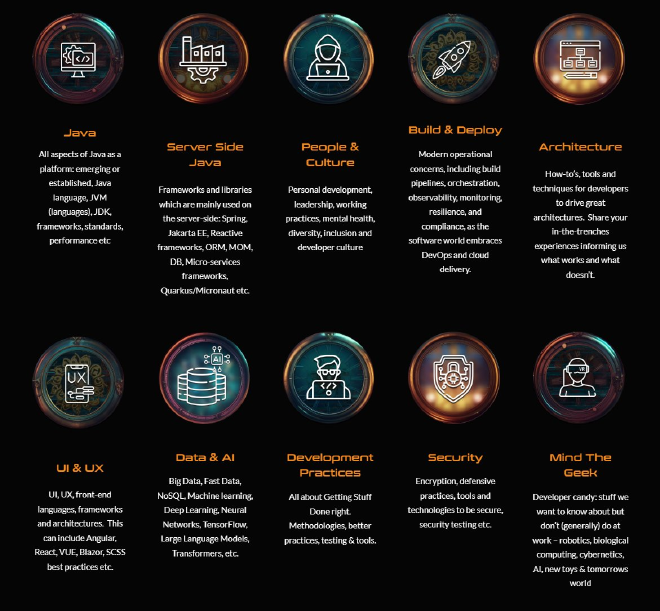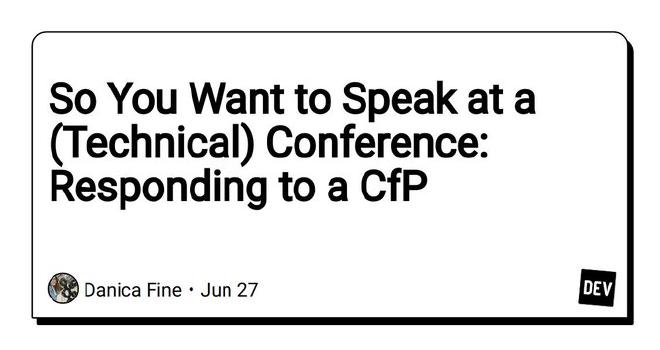I’ve been reviewing a lot of CFP submissions recently, both as someone in a program committee and during the Community Review for Devoxx Belgium. While I can’t give you a recipe for 100% success, I thought it would be helpful to list the reasons why I (personally!) give talks a lower rating.
Before you “ChatGPT: summarize” this, here is the TLDR:
- Spelling, Grammar & Typos: Use spellchecking tools;
- On the Right Track: Make sure you submit content to the correct track;
- Timeliness of Content: Make sure your content is still relevant;
- Provide value: What is the audience going to get that is of value to them?;
- Abstract Length: Some abstracts are too long, some too short;
- Do or do not, there is no try: don’t use soft language that minimizes your talk;
- Be kind: leave a note for the reviewers, recognize them as humans;

If you want a bit more detail on these points, continue reading.
Spelling, Grammar & Typos#
Conference organizers are often charging money for the conference. In exchange, they need to offer visitors valuable content that justifies that cost. Most of the content during the conference is not in the hands of the organizers but in the hands of the people they select to give talks. This means that the selection committee needs to have confidence in the fact that a speaker will deliver valuable and quality content.
There is almost nothing that ruins the feeling of confidence more than spelling & grammatical mistakes in your submission. The reasoning is: If you can’t be bothered to check your abstract before you submit it, what would make me think you’d do better for your actual talk?
When I heard this the first time, I considered this exclusionary, dramatically limiting the chances of people who are not fluent in English. After giving it some more thought and talking to some people in the industry, these were some of the arguments I heard in favor of giving lower ratings for spelling/grammar mistakes.
- If the conference is in English, organizers should be allowed to expect a decent level of English in the abstract;
- There are more than enough tools out there to check the spelling and grammar of a piece of text. (Grammarly, Google, Word);
- Even if you don’t use a tool, you could always ask a native-speaking friend to check your submission for you;
Typos are also considered a no-go for the same reasons.
One of the talks I gave a very low score was a talk that had a typo in the title… which was the name of the framework they were going to talk about.
While some organizers will take the time to correct little mistakes and not let it impact their rating, more often your talk just won’t make it to the 2nd round of reviews.
On the Right Track#
On larger conference you might come across the concept of track. These are areas of expertise and knowledge the conference organizers want to highlight.

When submitting a talk, make sure you select the correct track for it.
If you want to present What's new in Java 21 and you submit it to the Data and AI track, that just doesn’t fit the track all, resulting in a much lower rating.
If your talk doesn’t fit any of the tracks, this might just not be the correct conference to submit to. There are plenty of others, so don’t give up!
While some organizers can move the talk to a different track for you, this is extra effort you are asking the organizers to do… some will do it, others will just bin your submission. As a community reviewer for Devoxx, I can’t move a talk to a different track at all. All I can do is leave a comment to the committee in the hopes they can change it. Until the track is changed, I feel I have no choice but to give it a low rating.
Timeliness of Content#
Submitting to a CFP is always a bit wibbly wobbly timey wimey. Quite often, you need to submit months before the conference takes place. There is always a risk that when the time comes to step on stage, what you were planning to talk about is no longer relevant. Can happen to the best of us and… hey, you already got accepted so that’s good! (how to deal with this situation might be for another post).

That doesn’t mean you shouldn’t be mindful of this when submitting your talks. Content still needs to be relevant!
The most egregious example was a submission which mentioned a framework I never heard of. Because I’m curious, I looked up the framework…
and was met with a big banner on the official website: "THIS PROJECT IS IN MAINTENANCE MODE".
While there is a specific niche for talks about deprecated frameworks, this abstract didn’t mention that intent at all. The abstract was praising the framework for being innovative and bleeding-edge. There is just no way that talk should make it to the conference schedule, so I rated it the lowest score.
But it doesn’t have to be a deprecated framework/library to warrant a lower score. Take the following example:
One of the talks I rated lower mentioned: ‘Virtual Threads are in Preview since Java 19’.
When you are talking about libraries, frameworks and tools, you need to not only keep your content but also your abstract up to date. In this case, I expected the author of the abstract to know the latest state on Virtual Threads at time of submission. (Context: Java 21 will make Virtual Threads final and Java 21 will be released before the conference).
While it might be a small thing… if this talk gets lined up against other talks about Virtual Threads (and I can assure you, there are many! #loomhype), this one might not make it.
Provide value & Abstract Length#
A good abstract should reflect the value people are going to get out of your talk. I was going to write a longer explanation about this… but it seems Danica beat me to it.
So instead of copying what she said, I’ll kindly redirect you to her post on the topic.

I heard she is working on more blogs post around this theme! So keep an eye on that!
Do or do not, there is no try#
It can be quite daunting to submit to a CFP, even for more seasoned speakers. While some submissions ooze confidence (sometimes on the edge of arrogance), other submissions suffer from a lack of confidence.
The latter often leads to the use of words that minimize the abstract! Some examples:
- “In this session, I’ll try to help you…”
- “I hope to convince you that…”
- “In this hopefully entertaining talk…”
Reading these abstracts, I caught myself thinking: “If they’ll try… or just hope to… then I need to guess:‘will they do it?’”. You are effectively making the organizers doubt whether you can do this talk or not. Instead of adding these minimizing words, use words that show certainty (even if you are filled with doubt, “fake it till you make it” is the name of the game).
- “In this session, I will help you…”
- “I will convince you that…”
- “In this entertaining talk…”
If you line up 10 equivalent talks about roughly the same topic… I can almost assure you that the ones that use confident language will be chosen over the ones that minimize themselves.

It’s as Yoda said: Do or do not. There is no try.
Be kind to the reviewers#
To end this post, maybe one piece of advice that’s a bit unexpected. Reviewing piles of submissions is a ton of work! Especially if you want to do it as fair as possible. I do read every letter of every submission and will almost always have a glance at the slides or videos if they are provided.
Just like any human being, reviewers like to be acknowledged for their work. This is why my advice has always been: Leave a kind comment for the organizers in the ’notes’ section of the submission. In the end, if you make them feel recognized, it’s not just good for them but also will increase your chances.
I hope that by listing these anti-patterns you have gotten a bit more insight in how you can improve your abstract. In case you need some additional help with your CfP submission, feel free to reach out to me. I don’t have unlimited time and can’t make any promises, but I will try to give you some good feedback.
Until the next time...lots of 💖
Tom